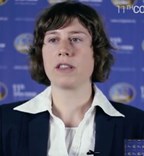9 - 10 May, 2016 / S.Servolo island, Venice
Increasing momentum for CO2 storage
+
11 May, 2016 / S.Servolo island, Venice
Parallel workshops

+

COP 21 in Paris resulted in an important agreement to keep the global temperature rise well below 2 °C. This target requires an unprecedented level of effort to reduce greenhouse gas emissions over the next few decades before 2050.
The Open Forum will focus on the future of CCS and in particular on the role CO2 storage will play in hitting crucial low carbon targets.
Topics to be addressed include the role of CCS in national roadmaps and regional implementation plans for a low carbon future; non-traditional CCS and its role for emission targets, e.g. utilisation, industry and bio-CCS; the status of storage pilots and large scale integrated projects.
The Open Forum will be devoted to topical sessions and state-of-the-art presentations given by renowned international experts, while the following day will be reserved for topical workshops.
The event, now at its 11th edition, has become a “must-attend” venue for stakeholders, including EU representatives, industry, regulators, public authorities, NGOs, and the research community, and gives a unique opportunity to meet and interact directly with Europe’s largest group of researchers on CO2 geological storage.
In fact, the CO2GeoNet association has continued to grow over the past years and now counts 26 members over 19 European countries, bringing together key research institutes all with CO2 storage research experience.
The first day is devoted to analyze how CCS can contribute to reach the ambitious targets of greenhouse gas reductions establised at COP21 (CDM and ETS mechanisms, European perspective and market makers) and how the national roadmaps are shaped for these goals in some European countries.
Moreover, emerging opportunities of "non-traditional" CCS will be reported.
The second day will analyze te status and progress of large scale integrated projects and storage pilots, and research and development can support CCS implementation.
Running and just starting new initiatives will be described, giving a unique opportunity to interact with EC officers, site owners and coordinators of large research projects and networks.
The workshop will look into the following aspects of leakage risks and liability: Geological uncertainty; identification, probability and magnitude of events that can lead to leakage of CO2; possible impacts from such events; remediation costs; storage liability.
The workshop will explore the opportunities for catalysing and developing transport and storage infrastructure to provide confidence to nascent capture projects that their CO2 will be stored, whilst enabling the transport and storage operators to develop business models less dependent on point to point CCS projects.
The workshop will offer the opportunity to share experience between pilot projects that are ongoing or under preparation in European countries such as Spain, Israel, UK, the Netherlands and the Czech Republic.
